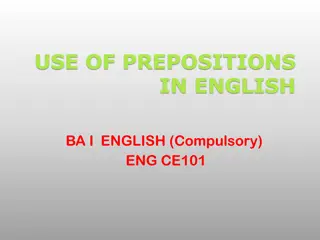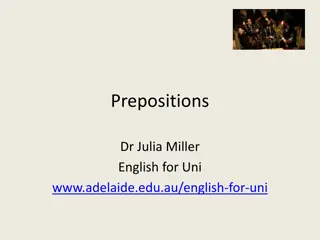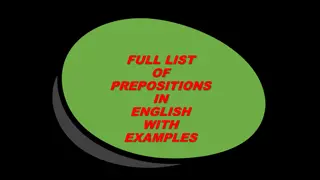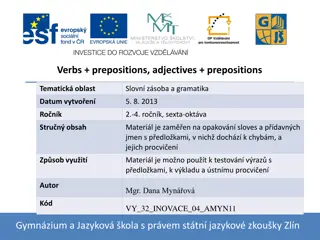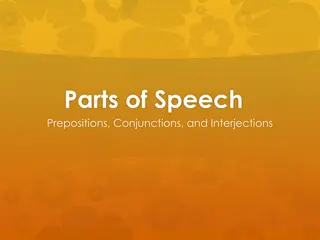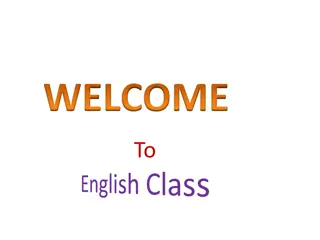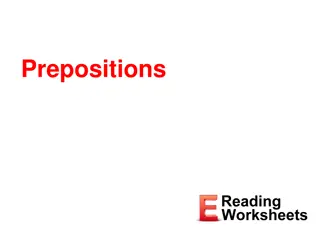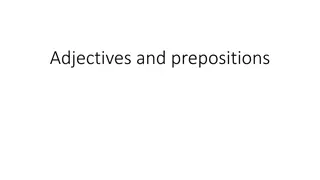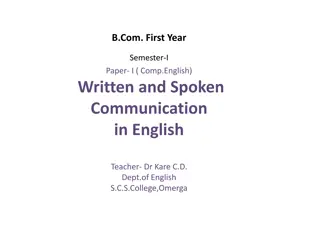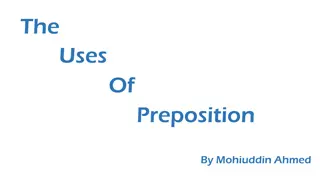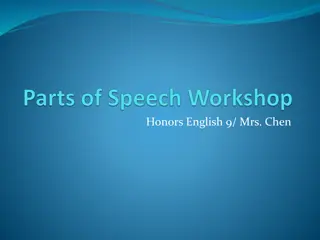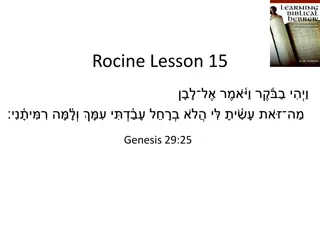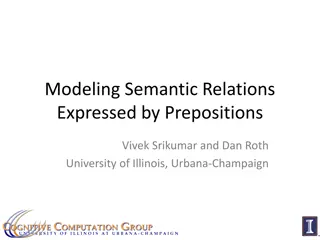Mastering English Prepositions: Common Challenges and Solutions
Understanding and correctly using English prepositions is a common challenge for non-native speakers. This article explores the difficulties faced, such as different prepositions with similar noun complements, proper usage of particles in verbal groups, and variations between British and American English. It also delves into the nuances of grammar and function words, highlighting the importance of mastering prepositions in English language learning.
Download Presentation

Please find below an Image/Link to download the presentation.
The content on the website is provided AS IS for your information and personal use only. It may not be sold, licensed, or shared on other websites without obtaining consent from the author. Download presentation by click this link. If you encounter any issues during the download, it is possible that the publisher has removed the file from their server.
E N D
Presentation Transcript
When a friend recently asked me what I, as a non-native speaker of English, considered the most difficult aspect of the English language, I answered, without hesitation: "The prepositions." This statement of mine has been confirmed by the countless texts, written by non-native authors, that I've had the opportunity to revise, both for our translation company and for this on-line publication. The wrong use of prepositions is by far the most common mistake these authors make. Gabe Bokor, Translation Journal (2011) 3
Problems Cross-linguistic Internal to English Paedogogic 4
Different prepositions with similar noun complements English Italian German I read it in the paper. L ho letto sul giornale. Ich habe es in der Zeitung gelesen. It depends on the weather. Dipende dal tempo. Es h ngt vom Wetter ab. 5
Particles in verbal groups English I m looking for a book. The game is over. Italian Cerco un libro. German Ich suche ein Buch. La partita finita. Das Spiel ist aus. 6
Grammar / function words = semantically empty Focus on grammatical (i.e. syntactic properties) Preposition obligatory or optional? The meeting is on Saturday. The meeting is next Saturday. Noun complement obligatory or optional? Sally came out of the house. Sally came out. Noun complement preceded by determiner or not? Ms Wilkinson is at school. Ms Wilkinson is at the school. 7
Variation between BrE and AmE in Oak Street at university on Oak Street at the university 8
Similar phrases, different meanings Different phrases, similar meanings in time vs on time by chance vs at random 9
Some far more common as particles out up down back 97.3% 87.4% 79.2% 77.4% Data from M. Davies, Frequency Dictionary 10
Resources Textbooks Dictionaries Reference grammars 11
Collins Cobuild: 43 meanings for entry on Macmillan: 33 + 9 submeanings 1. touching a surface or an object 2. at a particular time 3. supported by a part of your body 4. in a particular place 5. in a list 6. hitting against sth 7. wearing sth 8. looking at sb/sth [ ] 12
Oxford Guide to English Grammar Unit 27 Prepositions Introduction to prepositions Prepositions of place Prepositions of time Prepositions with other meanings Idiomatic phrases with prepositions 13
at one-dimensional on two-dimensional in three-dimensional 15
Two main criteria of classification Space vs time Dimension 16
Activity Temporal and spatial senses of prepositions 1. All the children danced in a circle around Mary. 2. The hammock was suspended between two sturdy trees. 3. A police helicopter hovered over the stadium. 4. Drop by my house before 7 p.m. 5. They laid carpet throughout the apartment. 17
Activity Complete the following prepositional phrases with expressions of time around _______________ between ________________ over _______________ by ______________ thoughout _______________ 18
More on spatial meanings of prepositions 19
Activity Categorizing objects by dimension: at, on, or in? 20
An object or a group of objects (a scene) can be construed as one-, two-, or three-dimensional depending on our cognitive interests. 23
The objects that constitute a scene do not appear to us to be equal in importance. Typically, we focus on certain objects which stand out against a background of other less important ones. We focus on smaller, often more mobile objects. 24
We use prepositions to express the asymmetrical relationship between the objects we focus our attention on and the background of the scene. The same scene can be interpreted, or construed, in different ways, and these different construals are expressed through our choice of prepositions. 25
The lake is below the bird. The bird is flying above the water. 26
The hill is under the house. The house is on the hill. 27
There are white sheep surrounding a black sheep. The black sheep is surrounded by white sheep. 28
The silhouette captures the relationship between object and background, also known as figure and ground. 29
Basic meaning of on: contact & support Rotation generates different configurations. Static location may be result of movement. 34
Activity Make a simple drawing for each of the following scenes. Dorothy sat down on the floor. Toto hid under the bed. Aunt Em opened the trap door in the floor. She was halfway across the room. Aunt Em came to the door. 35
References Bokor, Gabe. Review of S. Lindstromberg, English Prepositions Explained, Translation Journal, 15:1 (2011). Collins Cobuild English Dictionary for Advanced Learners (2001). Davies, Mark & Dee Gardem. A Frequency Dictionary of Contemporary American English (Routledge, 2010). Eastwood, Michael. Oxford Guide to English Grammar (1996). Macmillan English Dictionary for Advanced Learners (2007). 36
There are many idiomatic phrases beginning with a preposition. Most of them are without a/an or the. Here are some examples. I drive about ten thousand miles a year, on average. Did you go there on holiday or on business? Mr Jones is on leave this week. He ll be in the office next Monday. There are so many different computers on the market. I saw it on television. I heard it on the radio. 38




